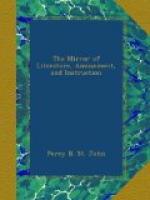is art; to be pleased with it therefore, implies a mind and
ear cultivated and refined. The same remark hold good with
instrumental music.
[8] We apologize to our zealous
correspondent for omitting the
ingenious
defence of War, contained in the Note to this passage.
Its
insertion would involve ourselves in a war—we
mean of
“words,
words, words.” As a private opinion, we
admit the
argument
of the defence; though it militates so strongly with
passion
and prejudice that its insertion would be the war-hoop
for
a whole community of peace-makers to break in upon
our
literary
otium. We wish to be the last in the world to
feed
a
popular fallacy on any subject; but in some respects
the
argument
employed in the journal quoted by M.L.B. is of too
general
a description to controvert the error in the present
case.
We must be courteous—though not of the court:
ours is a
system
of non-intervention in politics; ever, in matters of
literary
dispute we do little more than “bite our thumb.”
It is
hoped
our correspondent will rightly understand us; and so
now,
like
Mr. Peake’s bashful man in the farce, we offer
our apology
for
having apologized. By the way, in the, newspapers
is
advertised
a pamphlet, containing an apology for its
publication.—ED,
M.
[9] It is a pity that when
Voltaire wrote this clever paper, Gas and
Steam
were not in vogue to add to the “astonishments”
of Tullia.
This
would also most miraculously have assisted Madame de
Genlis,
in
that no less clever exposition of the wonders of nature
and
art,
the story of Alphonso and Thelismon.
* * * * *
NEW BOOKS.
* * * * *
THE YEAR OF WATERLOO.
[In continuation of our extracts from the very amusing Private Correspondence of a Woman of Fashion are the following incidents of this memorable era.]
Return of Napoleon.—At half-past nine o’clock the secretary announced to us that Napoleon had entered Paris quietly, without pageantry or mark of splendid triumph, and was seated at supper in the vacated palace of Louis XVIII!—
“On that same throne where Henri
great and good,
In glory sat—now sits this
man of blood;
Yet let not prejudice debase my line,
As warrior, as statesman, let him shine,—
Through all the world his mighty name
resound,
For arts of peace and deeds of arms renown’d:
Mark with what steady hand he rules the
State!
Yet wants the stamp of Virtue to
be Great!”




